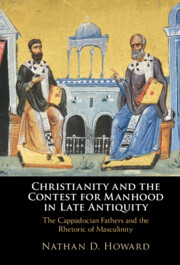 Christianity and the Contest for Manhood in Late Antiquity
Christianity and the Contest for Manhood in Late Antiquity Book contents
- Christianity and the Contest for Manhood in Late Antiquity
- Christianity and the Contest for Manhood in Late Antiquity
- Copyright page
- Dedication
- Contents
- Acknowledgments
- A Note on Translations
- Abbreviations
- The Cappadocian Fathers and their Families
- Introduction
- 1 “The Sweat of Eloquence”
- 2 The Agōn of Friendship
- 3 Hagiography and Masculinity
- 4 Agōn and Theological Authority
- Epilogue
- References
- Index
4 - Agōn and Theological Authority
Hagiography and Polemics of Identity
Published online by Cambridge University Press: 10 November 2022
- Christianity and the Contest for Manhood in Late Antiquity
- Christianity and the Contest for Manhood in Late Antiquity
- Copyright page
- Dedication
- Contents
- Acknowledgments
- A Note on Translations
- Abbreviations
- The Cappadocian Fathers and their Families
- Introduction
- 1 “The Sweat of Eloquence”
- 2 The Agōn of Friendship
- 3 Hagiography and Masculinity
- 4 Agōn and Theological Authority
- Epilogue
- References
- Index
Summary
Chapter 4 treats the Cappadocians’ hagiographic biographies in conjunction with their polemic against non-Trinitarian theologians.The chapter begins by outlining the background and teachings of Eunomius of Cyzicus (c. 335–c. 395), a longtime heterousian rival to the Cappadocians. The chapter analyzes the narratives about fourth-century Nicene bishop Athanasius of Alexandria (c. 298–372), Basil, and Macrina as hagiographies designed in part to contrast true (pro-Nicene) doctrine against the false philosophy of non-Trinitarians.These saints’ ascetic feats are recounted as spiritual ordeals fashioned as classical contests: in Athanasius, suffering multiple exiles because of standing up to false (heterousian) teachers; in Basil, countering threats to the Nicene faith by imperial officials; and in Macrina, enduring disease and death with unwavering resolve.In each case,Nyssen or Nazianzen emphasize that character is formed out of struggle; and that voice and speech (as a metaphor for doctrine) have been purified and validated in pro-Nicene theologians, but are corrupted and disingenuous in the untested charlatans they oppose.
Keywords
- Type
- Chapter
- Information
- Christianity and the Contest for Manhood in Late AntiquityThe Cappadocian Fathers and the Rhetoric of Masculinity, pp. 212 - 271Publisher: Cambridge University PressPrint publication year: 2022
